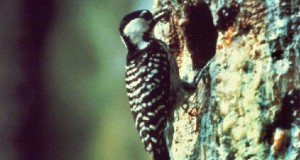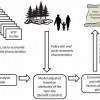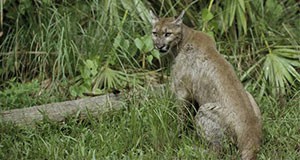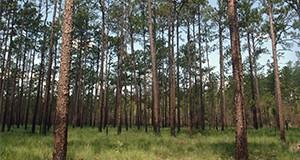Endangered Florida panthers live and breed on state and federal lands in south Florida, but they are a wide-ranging species, and the habitat available to them on public lands is not enough for them to thrive and recover. The 2008 Panther Recovery Plan by the US Fish and Wildlife Service requires that habitat for the panther be conserved on both public and private lands throughout the state. Private rangelands in southwest and south central Florida provide important habitat and prey for the Florida panther. These lands also play a key role in conserving other native species like gopher tortoises, bob white quail, turkeys, deer, vultures, scrub jays, cranes, black bears, and bobcats. Unfortunately, these rangelands are under increasing development pressure as the human population in Florida continues to grow. Multiple policy approaches have been put in place by local, state, and federal governments to address habitat loss and secure natural resources in Florida for our panthers. This 5-page fact sheet written by Elizabeth F. Pienaar and Melissa M. Kreye and published by the Department of Wildlife Ecology and Conservation provides a brief overview of existing regulatory and voluntary approaches to help conserve the Florida panther on private lands.
http://edis.ifas.ufl.edu/uw413
Tag: Melissa M. Kreye
Landowner Cost-Share Incentives and Payments for Ecosystem Services: A Comparison of Key Program Features
Landowners who conduct land management activities that protect environmental benefits may be eligible for several types of financial assistance from the government, but not all incentive strategies are the same. This 4-page fact sheet written by Melissa M. Kreye, Elizabeth Pienaar, and Raoul K. Boughton and published by the Department of Wildlife Ecology and Conservation compares traditional cost-share programs offered to landowners through federal agencies and a new type of market-based incentive program called payments for ecosystem services (PES). The information inside can help private landowners understand the advantages and limitations of both approaches and guide decision-makers in designing effective future conservation incentive programs.
edis.ifas.ufl.edu/uw415
Using the Ecosystem Services Approach to Advance Conservation Efforts on Private Lands
Decision-makers in Florida have shown increased interest in using the Ecosystem Services (ES) approach to reward ecosystem conservation efforts on private lands. For example, payments for ecosystem services (PES) strategies have been effective in motivating landowners to conserve ecosystems on their land. Some landowners may find a better understanding of the ES approach to be useful when deciding to participate in a PES program. This 5-page fact sheet written by Melissa M. Kreye, Elizabeth Pienaar, Raoul K. Boughton, and Lindsey Wiggins and published by Department of Wildlife Ecology and Conservation will provide landowners, Extension agents, government and agency leaders, and other stakeholders with a better understanding of how ES are classified, the different ways ES can be valued, how quantifying ES values can help support conservation efforts on private lands in Florida, and a few of the challenges inherent in using the ES approach.
edis.ifas.ufl.edu/uw414
Safe Harbor Agreement: A Regulatory Assurance under the Endangered Species Act

The involvement of the private sector is critical for the conservation and recovery of many species, but landowners’ fears that increased management restrictions could keep them from enjoying their land can present a challenge to securing their trust and assistance in conservation efforts. A Safe Harbor Agreement is a regulatory assurance that removes the risk of additional regulation in the future and encourages landowners to maintain important habitat on their lands. This three-page publication written by Melissa M. Kreye, Elizabeth F. Pienaar, Raoul K. Boughton, and Lindsey Wiggins and published by the Wildlife Ecology and Conservation Department provides Extension agents, decision-makers, and landowners with a basic understanding of a landowner’s obligations and the benefits of enrolling.
http://edis.ifas.ufl.edu/uw403
Valuing the Ecosystem Services of Florida‹s Forest Conservation Programs: The Economic Benefits of Protecting Water Quality (FOR309/FR377)
 How much are Floridians willing to pay for water quality protection programs that include forest conservation? This 9-page fact sheet reports the results of a study to answer this question, using a benefit transfer approach. Written by Melissa M. Kreye, Francisco J. Escobedo, Damian C. Adams, Taylor Stein, and Tatiana Borisova, and published by the UF Department of School of Forest Resources and Conservation, April 2013.
How much are Floridians willing to pay for water quality protection programs that include forest conservation? This 9-page fact sheet reports the results of a study to answer this question, using a benefit transfer approach. Written by Melissa M. Kreye, Francisco J. Escobedo, Damian C. Adams, Taylor Stein, and Tatiana Borisova, and published by the UF Department of School of Forest Resources and Conservation, April 2013.
http://edis.ifas.ufl.edu/fr377


